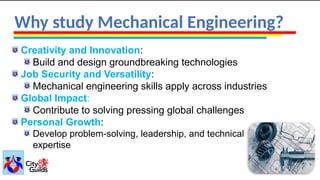Electrical and electronic and mechanical engineering
- 2. SKY STAR ENGINEERING COLLEGE Daw Khin Nilar Aye
- 5. Mechanical Engineering Manufacturing Design Analysis Maintenance Innovation
- 8. Why study Mechanical Engineering? Creativity and Innovation: Build and design groundbreaking technologies Job Security and Versatility: Mechanical engineering skills apply across industries Global Impact: Contribute to solving pressing global challenges Personal Growth: Develop problem-solving, leadership, and technical expertise
- 9. Technical Skills: ’āś Design and manufacturing ’āś Problem-solving in engineering ’āś Proficiency in CAD software Soft Skills: ’āś Teamwork and collaboration ’āś Project management ’āś Communication skills Skills Development
- 10. Development of transportation systems (cars, planes, trains). Advancements in manufacturing (mass production, automation). Energy systems (renewable energy, power plants). Healthcare innovations (prosthetics, medical devices). Impact on Society
- 11. Transforming Home and Workplace W Development of household appliances (washing machines, refrigerators, HVAC systems) for convenience and efficiency. W Ergonomic office furniture and tools for a healthier work environment. W Automation in workplaces for higher productivity and reduced human strain. Enhancing the quality of life
- 12. Challenges: ’āś Balancing innovation with sustainability. ’āś Addressing skills gaps in modern engineering fields. ’āś Managing ethical implications of automation and robotics. Opportunities: ’āś Growth of smart technologies (IoT, robotics). ’āś Sustainable engineering for climate change solutions. ’āś Advancing space exploration and infrastructure. Challenges and Future Opportunities
- 13. Factory Automobile 06 M & E Heavy Machinery Oil & Gas 01 02 03 04 05 Marine Career Opportunities
- 14. Diverse Fields: ’āś Automotive ’āś Aerospace ’āś Renewable Energy ’āś Manufacturing ’āś Robotics ’āś Research and Development (R&D) Job Roles: ’āś Mechanical Engineer ’āś Design Engineer ’āś Automation Specialist ’āś Project Manager Growth and Demand: ’āś High demand globally for skilled engineers ’āś Competitive salaries and advancement opportunities Career Opportunities
- 15. ’ā╝ City & Guild Mechanical Engineering Diploma Level (3) Manufacturing Engineering Diploma ŌĆō 6 Months Maintenance Engineering Diploma ŌĆō 6 Months ’ā╝ City & Guild Mechanical Engineering Diploma Level (4) ŌĆō 1 Year ’ā╝ City & Guild Mechanical Engineering Diploma Level (5) ŌĆō 1 Year
- 16. Level - 3 Level - 4 Level - 5 (I) Manufacturing Engineering Diploma (2850 ŌĆō 89) 301 ŌĆō Engineering Health and Safety (Online ŌĆō Test) 302 ŌĆō Engineering Principles (Online ŌĆō Test) 357 ŌĆō Principles of Mechanical Manufacturing (Written ŌĆō Test) 323 ŌĆō Machining Materials by Turning (Assignment ŌĆō Test) 330 ŌĆō Organizing and Managing Engineering Operations (Assignment ŌĆō Test) 322 ŌĆō Power generation system and ancillary equipment (Assignment ŌĆō Test) (II) Maintenance Engineering Diploma (2850 ŌĆō 88) 356 ŌĆō Principles of Engineering Maintenance , Installation and Commissioning (Written ŌĆō Test) 317 ŌĆō Maintenance of Machine System (Assignment ŌĆō Test) 301, 302, 330, 322 401 ŌĆō Engineering Mathematics (Written ŌĆō Test) 428 ŌĆō Electrical Principles for Mechanical Engineering (Written ŌĆō Test) 429 ŌĆō Principles of Mechanical Engineering (Written ŌĆō Test) 430 ŌĆō Engineering Fluid Mechanics and Thermodynamics (Assignment ŌĆō Test) 407 ŌĆō Computer Aided Design for Manufacture (Assignment ŌĆō Test) 422 ŌĆō Personal and Professional Development (Assignment ŌĆō Test) 424 ŌĆō Engineering Procurement (Assignment ŌĆō Test) 436 ŌĆō Metal Fabrication Technology (Assignment ŌĆō Test) 437 ŌĆō Welding Technology and Practice (Assignment ŌĆō Test) 433 ŌĆō Automated Machining of materials (Assignment ŌĆō Test) 438 ŌĆō Quality Assurance and Testing of Welding Joint (Assignment ŌĆō Test) 503 ŌĆō Engineering Project (Assignment ŌĆō Test) 504 ŌĆō Project Management (Assignment ŌĆō Test) 513 - Advanced Engineering Mathematics (Written ŌĆō Test) 514 ŌĆō Analysis of the Mechanics Fluids (Written ŌĆō Test) 515 ŌĆō Applied Thermodynamics (Written ŌĆō Test) 516 ŌĆō Mechanics of Solids (Written ŌĆō Test) 517 ŌĆō Properties of Materials for Engineering Applications (Written ŌĆō Test) 518 ŌĆō Dynamics of Machine Systems (Written ŌĆō Test) Mechanical Engineering Diploma
- 22. Summary: ’ā╝ Mechanical engineering has a profound and positive impact on society, improving quality of life and driving innovation. ’ā╝ Its future lies in balancing progress with sustainability. Call to Action: ’ā╝ ŌĆ£Join the movement: Be part of shaping the future through mechanical engineering.ŌĆØ Conclusion and Call to Action
- 23. THANK YOU WELCOME TO SKY STAR ENGINEERING COLLEGE!






















